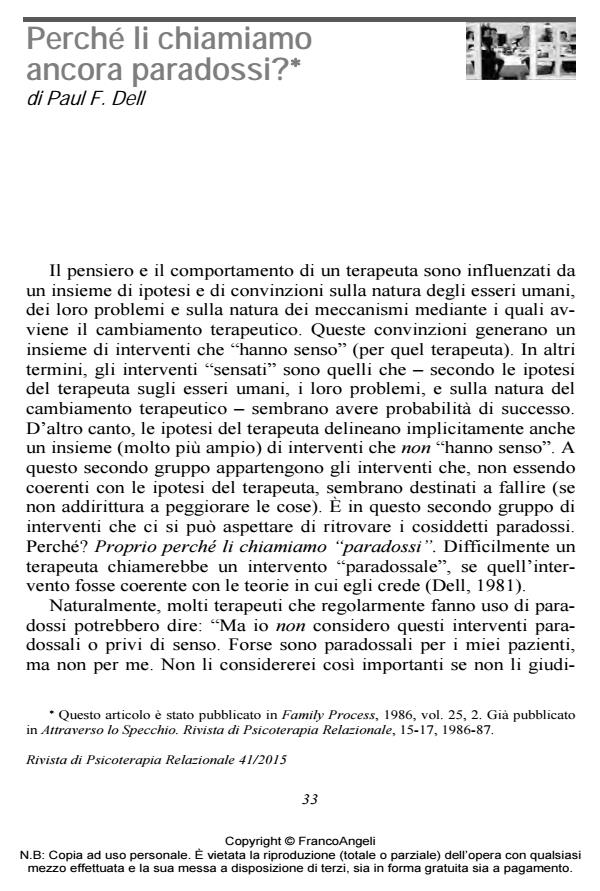Perché li chiamiamo ancora paradossi?
Journal title RIVISTA DI PSICOTERAPIA RELAZIONALE
Author/s Paul F. Dell
Publishing Year 2015 Issue 2015/41 Language Italian
Pages 20 P. 33-52 File size 75 KB
DOI 10.3280/PR2015-041005
DOI is like a bar code for intellectual property: to have more infomation
click here
Below, you can see the article first page
If you want to buy this article in PDF format, you can do it, following the instructions to buy download credits

FrancoAngeli is member of Publishers International Linking Association, Inc (PILA), a not-for-profit association which run the CrossRef service enabling links to and from online scholarly content.
- Glasersfeld E. von (1984). An introduction to radical constructivism. In:
- Watzlawick P. (ed.). The invented reality. New York: W.W. Norton.
- Glasersfeld E. von (1984). Reconstructing the concept of knowledge. Paper presented at the Seminar on Constructivism, Archives of Jean Piaget, Geneva, Switzerland.
- Kuhn T.S. (1970). The structure of scientific revolutions (2nd edition). Chicago: University of Chicago Press.
- Maturana H.R. (1970). Neurophysiology of cognition. In: Garvey P. (ed.), Cognition: A multiple view. New York: Spartan.
- Maturana H.R. (1978). Biology of language: The epistemology of reality. In: Miller G.A., Lenneberg E. (eds.), Psychology and Biology of language and thought. New York: Academic Press.
- Maturana H.R. (1986). The biological foundation of self-consciousness and the physical domain of existence. Unpublished manuscript.
- Planck M. (1971). Scientific autobiography and other papers. Westport, CT: Greenwood Press.
- Ruesch J., Bateson G. (1951). Communication: The social matrix of psychiatry. New York: W.W. Norton (trad. it.: La matrice sociale della psichiatria. Bologna: Il Mulino, 1976).
- Shaw R. (1982). Principles of contextual therapy. Workshop presented at the Boston Center for Contextual Study, Boston, MA.
- Stolzenberg G. Can an inquiry into the foundations of mathematics tell us anything interesting about mind? In: Miller G.A., Lenneberg E. (eds.), Psychology and Biology of language and thought. New York: Academic Press (Reprinted in excerpted form in Watzlawick P. (ed.), The invented reality, New York: W.W. Norton, 1984).
- Watzlawick P. (1984). The invented reality. New York: W.W. Norton.
- Watzlawick P., Weakland J., Fisch R. (1974). Change: Principles of problem formation and problem resolution. New York: W.W. Norton (trad. it.: Change. Roma: Astrolabio, 1974).
- Gellner G.E. (1974). Legitimation of belief. New York: Cambridge University Press.
- Dell P.F. (1985). Review of P. Watzlawick’s “The lnvented Reality”. Family Process, 24: 290-294.
- Dell P.F. (1985). Understanding Bateson and Maturana: Toward a biological foundation for the social sciences. Journal of Marital and Family Therapy, 11: 1-20.
- Dell P.F. (1984). Why family therapy should go beyond homeostasis: A Kuhnian reply to Tyano, Carel and Ariel. Journal of MaritaI and Family Therapy, 10: 351-35.
- Dell P.F. (1983). From pathology to ethics. Family Therapy Networker, 7: 29-31, 64.
- Dell P.F. (1983). Clinical epistemology: A psychology for networking. lnvited plenary lecture presented to the 2lst annual meeting of the Association for Humanistic Psychology, Toronto, Ontario, Canada.
- Dell P.F. (1982). Pathology: The original sin. Lecture presented to the First International Conference on Epistemology, Psychotherapy and Psychopaholoy, Houston, TX.
- Dell P.F. (1982). Beyond homeostasis: Toward a concept of coherence. Family Process., 21: 21-41.
- Dell P.F. (1981). Paradox Redux. Journal of Marital and Family Therapy, 7: 127-134.
- Dell P.F. (1981). Some irreverent thoughts on paradox. Family Process, 20: 37-42.
- Berenson D. (1985). The OUT Workshop. Princeton, NJ.
- Bateson G. (1979). Mind and nature: A necessary unit. New York: Dutton E.P..(trad. it.: Mente e natura. Milano: Adelphi, 1984).
- Bateson G. (1972). The science of mind and order. In: Bateson G., Steps to an ecology of mind. New York: Ballantine Books (trad. it.: Verso un’ecologia della mente. Milano: Adelphi, 1976).
Paul F. Dell, Perché li chiamiamo ancora paradossi? in "RIVISTA DI PSICOTERAPIA RELAZIONALE " 41/2015, pp 33-52, DOI: 10.3280/PR2015-041005